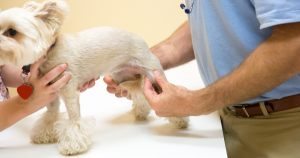Often age is not to blame.
First, let’s look at what the term arthritis means.
Arthritis = medical term for inflammation of the joints
Inflammatory joint disease can be caused by infection or underlying immune-mediated disease and usually impacts multiple joints and is accompanied by systemic illness signs such as fever, refusing food and all-over stiffness. This type of arthritis can be subdivided into infectious and immune-mediated categories, such as systemic lupus and septic arthritis.

Osteoarthritis (OA) is the most common form of dog arthritis and the eventual outcome of all forms of inflammatory joint disease.
Also known as degenerative joint disease or DJD, it has many causes, such as poorly formed joints (hip dysplasia/patella luxation), developmental defects (osteochondrosis), trauma, instability (cruciate ligament tear/rupture) and over-exercising/inappropriate exercising (placing ongoing or sudden stress on joints).
Genetics, obesity, nutrition, congenital disorders, old injuries and metabolic diseases such as Diabetes and Cushing’s can influence the progression rate.
Research shows that larger breeds and working/sporting breeds are more at risk.
Did you know that no dog wakes up one day and has arthritis?
They wake up one day with pain that has become too much to hide.
It is a chronic disease, and there is no cure.
Any dog at any age with any form of 𝗔𝗥𝗧𝗛𝗥𝗢𝗣𝗔𝗧𝗛𝗬 (𝗮 𝗰𝗼𝗹𝗹𝗲𝗰𝘁𝗶𝘃𝗲 𝘁𝗲𝗿𝗺 𝗳𝗼𝗿 𝗮𝗻𝘆 𝗱𝗶𝘀𝗲𝗮𝘀𝗲 𝗼𝗳 𝘁𝗵𝗲 𝗷𝗼𝗶𝗻𝘁𝘀) needs to be aware that secondary canine arthritis will develop.
Developmental joint dysplasia and congenital disorders (i.e., osteochondritis dissecans OCD)
Cruciate ligament degeneration
Patellar luxation
Metabolic, dietary, and endocrine abnormalities and various inflammatory processes can also be associated with joint dysfunction and disease.
Dogs who are overweight, sporting and working dogs and dogs who are senior should also all start a multimodal approach to arthritis as soon as possible.
The earlier you start on proactively managing the disease, the better.
- Diet and nutrition – this is where Antinol rapid fits in – with a powerhouse lipid profile, it will not only act as an anti-inflammatory support with regards to joint disease, but it will also drive cellular health and influence and support general well-being.
- Regular veterinary assessment
- Exercise – regularly and the right way for your dog involving canine therapists if you have a sporting dog or have an acute injury
- Weight control – objective body condition assessment.
Discussing canine degenerative diseases and how we can prevent them with Vet- Dr Nicole from Shy Tiger and Mont Albert Vet
Check out- Antinol Rapid


